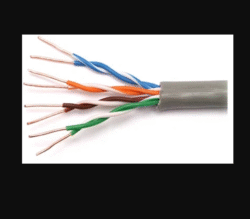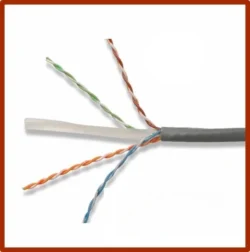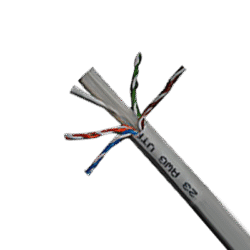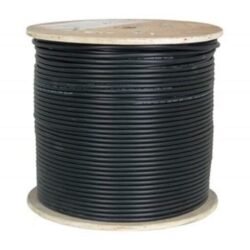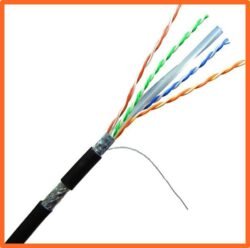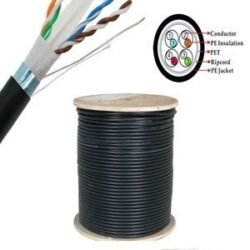Shielded (STP) vs Unshielded (UTP) Ethernet Cables

Choosing the right Ethernet cable in Kenya is essential for any home or business network installation in Kenya, especially as the fixed broadband market surpasses 2 million connections by mid-2025. With growing connectivity demands, understanding the critical differences between Unshielded Twisted Pair (UTP) and Shielded Twisted Pair (STP) cables ensures that your network performs reliably at its best.
This guide breaks down the key differences, practical use cases, and current local market considerations to help you make an informed decision.
Unshielded Twisted Pair (UTP) Cables
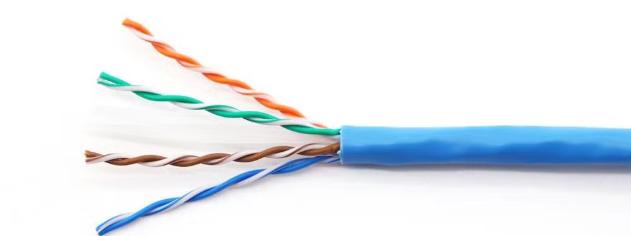
UTP pair ethernet cables are the most common and affordable Ethernet LAN cables used globally and are the staple for most residential and standard office setups in Kenya. They consist of four pairs of insulated copper wires twisted together, a technique that inherently reduces internal interference (crosstalk).
Why UTP is the Right Choice for Most:
- Cost-Effective: UTP cables, like EaseNet and D-Link are significantly more affordable. A 305m roll of quality Cat6 UTP cable typically ranges from KSh 6,500 to KSh 8,000, making it a budget-friendly option for homes and small businesses.
- Simple to Install: Their thinner, more flexible design makes them easy to run through conduits and tight spaces. They do not require special grounding, which simplifies the installation process and reduces the risk of improper setup.
- Ideal for Low-Interference Areas: For a typical home or office environment without heavy machinery or strong electromagnetic fields, UTP provides more than sufficient performance for daily tasks, 4K video streaming, and online gaming making them the best Ethernet Cables for Gaming & Streaming in Kenya.
Best Used For:
- Connecting computers, printers, and smart TVs within a home.
- Standard office networks where cables are not routed near electrical panels or fluorescent lights.
- Extending a fiber connection from ISPs like Safaricom or Faiba to a router or access point.
Shielded Twisted Pair (STP) Cables
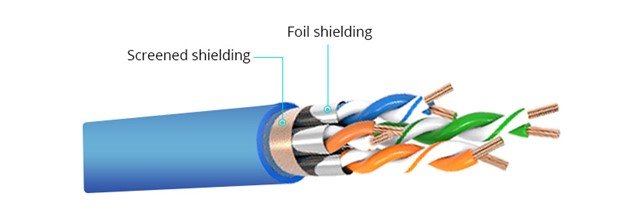
STP Ethernet cables have the same twisted wire pairs as UTP, but with an added layer of metallic foil or braiding wrapped around the conductors. This shielding acts as a powerful barrier against both internal crosstalk and external electromagnetic interference (EMI) and radio frequency interference (RFI).
Why STP is the Professional’s Choice:
- Superior Interference Protection: The shielding prevents signal degradation from external noise, ensuring a stable and consistent connection, even in the most challenging environments.
- Enhanced Performance: This superior protection allows STP cables to support higher data rates over longer distances with minimal loss in signal integrity.
- Durability: The added shielding makes the cable more robust, which is ideal for harsh indoor and outdoor environments.
Best Used For:
- Outdoor Installations: For running a network connection to an outdoor CCTV camera or a separate building, outdoor-rated shielded cables are essential. These cables are designed to withstand Kenya’s weather conditions and protect against EMI from power lines.
- Industrial and Data Centers: In manufacturing plants, data centers, or server rooms where cables are bundled and routed near heavy machinery, motors, or electrical cables, STP is critical to prevent data corruption and ensure network uptime.
- PoE and High-Speed Links: For connecting high-power Power over Ethernet (PoE) devices like advanced Wi-Fi 6 access points or long-distance backhaul links, STP cables provide the necessary stability.
Cost and Local Market Trends in Kenya
Shielded Twisted Pair (STP) cables offer strong interference protection but come at a higher price in Kenya. A 305m roll of quality Cat6 STP cable from brands like APS Finland, D-Link, Dahua, Hikvision, Vention, Giganet, EaseNet costs between KSh 12,500 and KSh 30,000.
Unshielded Twisted (UTP) cables are the most affordable, with popular brands like HAWKVision, EaseNet, RD-Com and D-Link offering 305m rolls for between KSh 4,000 and KSh 8,000. Their lower cost and easy installation make UTP ideal for most homes and small businesses.
As Kenya’s fiber and fixed wireless broadband rollout continues rapidly, home users prioritize cost and simplicity by choosing UTP cables, while businesses invest in STP to protect critical networks in complex environments.
UTP vs STP Ethernet Cables: Key Differences
| Feature | Unshielded Twisted Pair (UTP) | Shielded Twisted Pair (STP) |
| Shielding | None | Foil or braided shielding |
| EMI Resistance | Moderate (relies on twisting) | High (excellent protection from interference) |
| Price (per 305m roll) | KSh 4,000 – KSh 8,000 | KSh 12,500 – KSh 30,000+ |
| Installation Ease | Easier, no special grounding needed | More complex, requires proper grounding for effectiveness |
| Flexibility | More flexible and lighter | Thicker, less flexible, and heavier |
| Grounding Required | No | Yes |
| Interference Protection | Suitable for quiet/low interference areas | Ideal for industrial, commercial, and noisy environments |
| Typical Usage | Homes, small offices, general indoor environments | Data centers, industrial areas, outdoor/harsh environments |
For most Kenyan homeowners and small businesses in low-interference environments, a trusted Cat6 UTP cable offers the best balance of performance and affordability. For outdoor setups or high-noise areas such as warehouses, investing in shielded STP cables is essential to ensure stable, reliable networking.
Choose the right Ethernet cable today to future-proof your network’s speed and reliability. Whether it’s UTP for everyday use or STP for challenging environments, the right cable makes all the difference.



